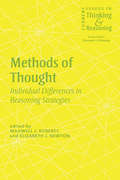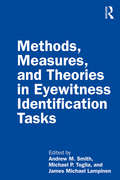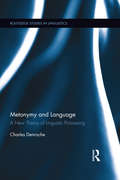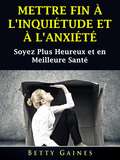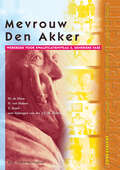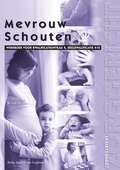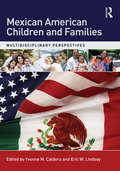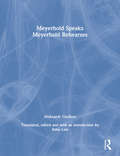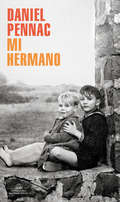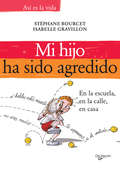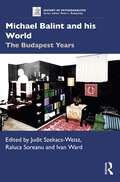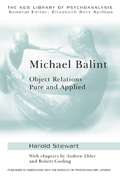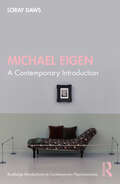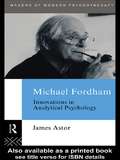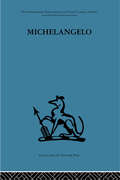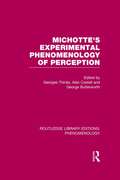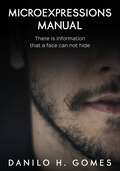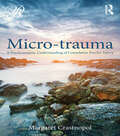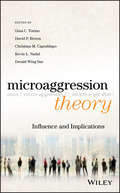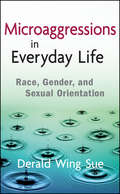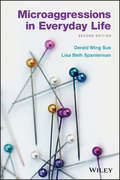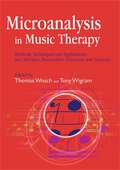- Table View
- List View
Methods of Thought: Individual Differences in Reasoning Strategies (Current Issues in Thinking and Reasoning)
by Maxwell J. Roberts Elizabeth J. NewtonHow do people make inferences? How do their reasoning processes differ and why? Methods of Thought attempts to answer these questions by looking in detail at the different reasoning strategies people apply, how these are acquired, how they are selected and how use of these strategies is influenced by individual and task properties. Focusing on empirical data and research into deductive reasoning tasks, this book summarizes current trends in the field and helps us to understand how individual differences in reasoning impact on other studies of higher cognitive abilities in humans. Contributors include researchers who have shown that people make deductions by using a variety of strategies, and others who have found that deductive reasoning problems provide a useful test-bed for investigating general theories of strategy development. Together, it is shown that these general theories derived from other domains have important implications for deductive reasoning, and also that findings by reasoning researchers have wider consequences for general theories of strategy development. This book will be of interest to anyone studying or working in the fields of reasoning, problem solving, and cognitive development, as well as cognitive science in general.
Methods, Measures, and Theories in Eyewitness Identification Tasks
by Andrew M. Smith Michael P. Toglia James Michael LampinenMethods, Measures, and Theories in Eyewitness Recognition Tasks provides a comprehensive review of the fundamental issues surrounding eyewitness recognition phenomena alongside suggestions for developing a more methodologically rigorous eyewitness science. Over the past 40 years, the field of eyewitness science has seen substantial advancement in eyewitness identification procedures, yet theoretical and methodological developments have fallen behind. Featuring contributions from prominent international scholars, this book examines methodological and theoretical limitations and explores important topics, including how to increase the accuracy of identifying perpetrators when using CCTV images, how to create more identifiable facial composites, and the differences in accuracy between younger and older eyewitnesses. Providing in-depth discussion on the limitations of traditional lineups, eyewitness memory fallibility, and the complications that arise when using laboratory simulations, along with suggestions for new methods, this book will be an invaluable resource for researchers in eyewitness recognition, lawyers, players in the criminal justice system, members of innocence commissions, and researchers with interests in cognitive psychology.
Metonymy and Language: A New Theory of Linguistic Processing (Routledge Studies in Linguistics)
by Charles DenrocheMetonymy and Language presents a new theory of language and communication in which the central focus is on the concept of metonymy, the recognition of partial matches and overlaps. Through the use of original data sets and rigorous primary research, Denroche characterizes metonymy as key to understanding why language is so ‘fit for purpose’ and how it achieves such great subtlety and flexibility. This study develops the notion of ‘metonymic competence’ and demonstrates that metonymic behavior is often pursued for its own sake in recreational activities, such as quizzes, puzzles and play, and shows the possible impact of the application of metonymic processing theory to professional fields, such as language teaching and translator training. Furthermore, it proposes a research approach with metonymy at its center, ‘metonymics,’ which Denroche suggests could provide a powerful framework for addressing issues in numerous fields of practice in the arts and sciences.
Mettre Fin à L'inquiétude et à L'anxiété: Soyez Plus Heureux et en Meilleure Santé
by Betty GainesUn guide détaillé pour comprendre et éliminer les attaques de peur, de dépression, de panique et d'anxiété. Ce guide vous aidera à gérer et à éliminer votre anxiété. Il vous guidera également à travers les meilleures pratiques pour les surmonter. L'utilisation de médicaments pour lutter contre ces problèmes entraîne de nombreux effets secondaires désagréables et n'est pas recommandée, car ces problémes peuvent être surmontés naturellement. C'est pourquoi ce guide se concentre sur tous les méthodes naturels afin de vous donner les meilleurs résultats sans effets secondaires. Basé sur des données scientifiques solides et éprouvées, ce livre vous apprendra comment: - fair un stop à la panique - Arrêter le stress et l'anxiété - Utiliser des méthodes naturelles pour soulager l'inquiétude, la peur, la dépression et l'anxiété - Mieux dormir - Se sentir en meilleure santé et avoir plus d'énergie pour profiter de la vie - Penser plus clairement - Vivre la vie que vous méritez Si vous voulez être a votre meilleur avec peu ou pas d'inquiétude, de peur, et d'anxiété , alors ce livre est pour vous. -> Faites défiler vers le haut de la page et cliquez sur Ajouter au panier pour acheter instantanément
Mevrouw Den Akker
by Y. Smid M. De Haan N. Van HalemHoofdpersoon in de casus is mevrouw Den Akker. Een oudere dame, die na een leven met haar echtgenoot, haar werk, de zorg voor de kinderen en allerlei activiteiten in de samenleving, nu in allerlei opzichten achteruit gaat en verzorgd moet worden. Een dame die je in menig verzorgingshuis zou kunnen tegenkomen. De specifieke zorg voor mevrouw Den Akker op het gebied van voeding en uitscheiding heeft in deze casus met het clusterthema "voeding en uitscheiding" speciaal de aandacht.
Mevrouw Schouten
by Nicolien Van Halem C. OttenZorgcategorie: Kraamvrouw Setting: KraamafdelingKorte inhoud: Bij de meeste vrouwen verlopen de zwangerschap, de bevalling en de kraamperiode zonder problemen, maar niet bij alle. Hanneke Schouten is zo'n vrouw. In de loop van de zwangerschap moet zij steeds meer rekening houden met gezondheidsproblemen. Een geplande thuisbevalling wordt verplaatst naar het ziekenhuis en ook de bevalling en de eerste uren daarna verlopen niet zonder problemen. Hierdoor is ook het kraambed anders en op een andere locatie dan Hanneke en haar man van tevoren bedacht hadden.
Mexican American Children and Families: Multidisciplinary Perspectives
by Yvonne M. Caldera Eric W. LindseyOffering insight on Mexican American culture, families, and children, this book provides an interdisciplinary examination of this growing population. Leaders from psychology, education, health, and social policy review recent research and provide policy implications of their findings. Both quantitative and qualitative literature is summarized. Using current theories, the handbook reviews the cultural, social, and inter- and intra-personal experiences that contribute to the well-being of Mexican Americans. Each chapter follows the same format to make comparisons easier. Researchers and students from various disciplines interested in Mexican Americans will appreciate this accessible book.
Meyerhold Speaks/Meyerhold Rehearse
by V.E. Meyerhold Aleksandr GladkovRussian theatre director, Vsevolod Meyerhold, has been called the Picasso of modern theatre. A ceaseless experimenter with new forms and techniques and the leader of an aesthetic revolution, he left no body of theoretical writings. What takes their place are the reminiscences and confessions made in conversations with pupils and friends, some of which were recorded by Aleksandr Gladkov during his years of close association with Meyerhold. This book aims to capture the essence of Meyerhold's personality and temperament as revealed in the director's own informal comments about his rich, varied experiences. His notes, made at rehersals, present Meyerhold in action.
Mi hermano
by Daniel PennacLa obra más íntima de Pennac, una memoria que convierte al Bartleby de Melville en un espejo para comprender y recordar a su hermano. En su libro más personal hasta la fecha, Daniel Pennac recuerda de la manera más emotiva y original a su hermano fallecido: a través de la figura de Bartleby, el célebre escribiente de Herman Melville. Así, Pennac amplía las costuras de la literatura de duelo y se sirve de su amor por las letras para crear unas memorias preciosas. El autor parte de una certeza compartida por todos: nunca llegamos a conocer en su totalidad a nuestros seres más queridos. Con el objetivo de comprender mejor a su hermano, Pennac revisita al escribiente procrastinador de Melville, un personaje muy querido por los dos, y le convierte en una suerte de espejo en el que observar y recordar a Bernard. Así Pennac firma un libro de una ternura infinita que se convierte a la vez en una oda a la literatura. La crítica ha dicho...«Un texto de una gran belleza.»Le Figaro «El escritor rinde un bello homenaje a quien le transmitió el amor por la literatura, su hermano mayor Bernard, tan parecido al personaje de Melville.»Le Monde «Magnífica historia, un grito sobrecogedor de amor al hermano desaparecido.»L'Express «El escritor francés da voz a una dimensión íntima»Eleonora Groppetti, Corriere di Novara «La fragilidad de los supervivientes.»Nadia Terranova, Il Foglio «Pennac [...] no necesita ganarse el corazón de sus lectores. Ya está en sus corazones.»Eleonora Groppetti, Corriere di Novara «Un homenaje al hermano amado y perdido.»La Repubblica «Refinado.»Corriere di Novara «Una novela que describe la figura del hermano perdido, entre los recuerdos personales y la literatura.»La Stampa «Esta historia de construcción admirable está impregnada tanto por la ternura hacia un hermano como por el amor hacia la literatura. Jamás se ha encontrado nada mejor para prolongar la vida de los desaparecidos. Daniel Pennac lo logra con una naturalidad abrumadora.»Olivia de Lamberterie, Elle France «Con una ternura infinita, Daniel Pennac habla de la distancia y el humor de su hermano, el placer de su compañía, su presencia atenta y discreta.»Michel Abescat, Télérama «Un libro de una gran belleza melancólica donde Daniel Pennac -el seductor, el profesor que agrada a su público- abandona el centro de atención para revelar la originalidad herida, la renuncia de su hermano soñador.»Patrick Grainville, Le Figaro Littéraire
Mi hijo ha sido agredido
by Isabelle Gravillon Stéphane BourcetRecibir insultos, golpes, chantajes o incluso otras agresiones y abusos forma parte, cada vez con más frecuencia, de nuestra vida cotidiana. Son situaciones a las que algunos niños o adolescentes, o quizá nuestro hijo, tienen que enfrentarse un día. Sin embargo, a menudo a los padres les cuesta comprender cómo y por qué sufre su hijo esa situación, y desconocen cómo deben reaccionar. Este libro les ayudará a resolver las preguntas más habituales, como por ejemplo: * ¿Por qué corre ese peligro mi hijo? * ¿Por qué no sabe dominar esa situación? * ¿Cuál es la manera más adecuada de reaccionar ante una agresión? * ¿Debo denunciar ese acoso? * ¿Cómo y dónde hacerlo en primer lugar? Stéphane Bourcet es psiquiatra infantil. Isabelle Gravillon es periodista.
Michael Balint and his World: The Budapest Years (History of Psychoanalysis)
by Ivan Ward Raluca Soreanu Judit Szekacs-WeiszThis fascinating collection explores the life of renowned psychoanalyst Michael Balint in his native Budapest. With a Balint revival in mind, Michael Balint and his World: The Budapest Years brings together the work of psychoanalysts, social thinkers, historians, literary scholars, artists and medical doctors who draw on Balint’s work in a variety of ways. The book focuses on Balint’s early years in Budapest, where he worked with Sándor Ferenczi and a circle of colleagues, capturing the transformations of psychoanalytic thinking as it happens in a network of living relationships. Tracing creative disagreements as well as collaborations, and setting these exchanges in the climate of scientific, social and cultural developments of the time, Michael Balint and his World: The Budapest Years follows the development of psychoanalytic thinking during these critical times. The book recalls the story of several “lost children” of the Budapest School and reconstitutes Balint’s important early contributions on primary love. It also examines his little-known relationship with Lacan, including the extended discussion of Balint’s work by Wladimir Granoff in Lacan’s first public seminar in Paris in 1954, published here for the first time. This important book provides a fresh perspective on Balint’s enormous contribution to the field of psychoanalysis and will interest both scholars and clinicians. It will also inspire those interested in clinical practice and the applications of psychoanalysis to the cultural sphere.
Michael Balint: Object Relations, Pure and Applied (The New Library of Psychoanalysis)
by Harold Stewart Andrew Elder Robert GoslingWhilst Michael Balint's applied work is widely known, many of his theoretical contributions have been incorporated into everyday analysis without due recognition of their source. In this account of his thinking, Harold Stewart evaluates the extent of Balint's contribution to psychoanalysis and firmly re-establishes his place within the development of Object Relations theory. The first section examines Balint's theories of human psychological development, defining such concepts as primary love, ocnophilia and philobatia, the basic fault and the three areas of the mind. The author places Balint's understanding of the analyst's influence and technique in the context of his relationship with Sandor Ferenczi, his analyst and mentor. The second section of this work looks at how the "Balint Group" has contributed to the assessment and understanding of emotional problems in various areas, including general practice, marital work and psychosexual medicine. A charismatic teacher, Balint's method of work with General Practitioners has become an established worldwide institution. Features of this work, including the use of countertransference and the affective response of the doctor are vividly described here by two General Practitioners, Andrew Elder and Robert Gosling. Michael Balint: Object Relations, Pure and Applied brings alive Balint's teaching and practice and demonstrates the relevance of his theories to many of the problematic issues in current analytic practice.
Michael Eigen: A Contemporary Introduction (Routledge Introductions to Contemporary Psychoanalysis)
by Loray DawsThis insightful book critically reviews and presents an accessible introduction to the life and work of one of the most celebrated modern psychoanalysts, Michael Eigen. With work spanning over five decades, countless articles, and thirty published book volumes, Daws explores Eigen’s main works through key themes and concepts such as working with our psychotic core, psychic deadness, primary affects, and the need for spirituality for practicing psychoanalysts. The book covers Eigen’s early life and formative clinical years, explores his re-reading of Freud, Jung and Lacan, and lastly covers Eigen’s Seoul seminars, the impact of trauma, the importance of faith and the use of Kabbalah as a framework for analysis. This book will not only engage the first-time Eigen reader, but will also be of much interest to the experienced psychologist and psychoanalyst already familiar with Eigen’s work.
Michael Fordham: Innovations in Analytical Psychology (Makers of Modern Psychotherapy)
by James AstorMichael Fordham's immense contribution to analytical psychology has been marked by its combination of practical and theoretical genius. Before retirement he ran a full clinical practice alongside the co-editorship of The Collected Works of Jung, development of the Society of Analytical Psychology and its child and adult trainings, and a fifteen-year editorship of the Journal of Analytical Psychology. In his published work there has emerged a consistent and original contribution to Jungian thought, particularly in relation to the processes of individuation on childhood, and the links between analytical psychology and the work of the Kleinians. James Astor takes a critical and informed look at Fordham's work and ideas. Illustrating theory with examples drawn from clinical practice, the book will provide a useful amplification of Fordham's own work for students of analytical psychology and a sound introduction to it for analysts interested in understanding the connections between post-Jungian and post-Kleinian thought.
Michelangelo's Finger: An Exploration of Everyday Transcendence
by Raymond TallisIn this startlingly original and persuasive book, Raymond Tallis shows that it is easy to underestimate the influence of small things in determining what manner of creatures humans are. He argues that the independent movement of the human index finger is one such easily overlooked factor. Indeed, not for nothing is the index finger called the "forefinger. " It is the finger we most naturally deploy when we want to pry objects out of small spaces, but it plays a far more significant role in an action unique to us among primates: pointing. Tallis argues that it is through pointing that the index finger made a significant contribution to the development of humans and to the creation of a human world separate from the rest of the natural world. Observing the ceiling of the Sistine Chapel and the hugely familiar and awkward encounter between Michelangelo's God and Man through their index fingers, Tallis identifies the artist's intuitive awareness of the central role of the index finger in making us unique. Just as the reaching index fingers of God and Man are here made central to the creation of our kind, so Tallis believes that the seemingly simple act of pointing, which is used in a wide variety of ways, is central to our extraordinary evolution.
Michelangelo: A Study In The Nature Of Art (Routledge Classics)
by Adrian StokesAdrian Stokes was one of the twentieth century's finest and most discriminating writers on art. Of over twenty works of art criticism, Michelangelo was considered by Lawrence Gowing to be the most complete he ever wrote, presenting an understanding of the great artist that no one subsequently could afford to ignore. Stokes brings to bear in this work not only twenty-five years' study and appreciation of Italian Renaissance art and of aesthetics, but also a unique psychological perspective, as he explains in his introduction, which enables him to uncover the depths of the artist's personality. The subtlety of feeling and profound knowledge of sculpture which Sir Herbert Read admired in Stokes's work is also combined with a literary style perfected through his own poetry and criticism. Presenting a unique survey of his subject's literary as well as his artistic legacy, Stokes succeeds, as no other has before or since, in his aim of bringing Michelangelo's greatness into nearer view.
Michelangelo: A study in the nature of art (Routledge Classics Ser.)
by Adrian StokesTavistock Press was established as a co-operative venture between the Tavistock Institute and Routledge & Kegan Paul (RKP) in the 1950s to produce a series of major contributions across the social sciences. This volume is part of a 2001 reissue of a selection of those important works which have since gone out of print, or are difficult to locate. Published by Routledge, 112 volumes in total are being brought together under the name The International Behavioural and Social Sciences Library: Classics from the Tavistock Press. Reproduced here in facsimile, this volume was originally published in 1955 and is available individually. The collection is also available in a number of themed mini-sets of between 5 and 13 volumes, or as a complete collection.
Michotte's Experimental Phenomenology of Perception (Routledge Library Editions: Phenomenology)
by Georges Thinès, Alan Costall and George ButterworthThis volume of collected papers, with the accompanying essays by the editors, is the definitive source book for the work of this important experimental psychologist. Originally published in 1991, it offered previously inaccessible essays by Albert Michotte on phenomenal causality, phenomenal permanence, phenomenal reality, and perception and cognition. Within these four sections are the most significant and representative of the Belgian psychologist's research in the area of experimental phenomenology. Extremely insightful introductions by the editors are included that place the essays in context. Michotte's ideas have played an important role in much research on the development of perception, and his work on social perception continues to be influential in social psychology. The book also includes some lesser-known aspects of his work that are equally important; for example, a remarkable set of articles on pictorial analysis.
Micro Expressions Manual: There is information that a face can not hide
by Danilo H. GomesBody language is one of the most complex and effective studies in psychology and psychiatry. Reading human gesture techniques are present in police investigations, psychotherapy clinics, schools and other related places. While generally being assertive, observing body gestures can provide some confusing and ambiguous information. When dealing with micro facial expressions, the chances of getting it right are very high, in addition, your observation provides more accurate information.
Micro-trauma: A Psychoanalytic Understanding of Cumulative Psychic Injury (Psychoanalysis in a New Key Book Series)
by Margaret CrastnopolMicro-trauma: A psychoanalytic understanding of cumulative psychic injury explores the "micro-traumatic" or small, subtle psychic hurts that build up to undermine a person’s sense of self-worth, skewing his or her character and compromising his or her relatedness to others. These injuries amount to what has been previously called "cumulative" or "relational trauma." Until now, psychoanalysis has explained such negative influences in broad strokes, using general concepts like psychosexual urges, narcissistic needs, and separation-individuation aims, among others. Taking a fresh approach, Margaret Crastnopol identifies certain specific patterns of injurious relating that cause damage in predictable ways; she shows how these destructive processes can be identified, stopped in their tracks, and replaced by a healthier way of functioning. Seven different types of micro-trauma, all largely hidden in plain sight, are described in detail, and many others are discussed more briefly. Three of these micro-traumas—"psychic airbrushing and excessive niceness," "uneasy intimacy," and "connoisseurship gone awry"—have a predominantly positive emotional tone, while the other four—"unkind cutting back," "unbridled indignation," "chronic entrenchment," and "little murders"—have a distinctly negative one. Margaret Crastnopol shows how these toxic processes may take place within a dyadic relationship, a family group, or a social clique, causing collateral psychic damage all around as a consequence. Using illustrations drawn from psychoanalytic treatment, literary fiction, and everyday life, Micro-trauma : A psychoanalytic understanding of cumulative psychic injury outlines how each micro-traumatic pattern develops and manifests itself, and how it wreaks its damage. The book shows how an awareness of these patterns can give us the therapeutic leverage needed to reshape them for the good. This publication will be an invaluable resource for psychoanalysts, psychologists, psychiatrists, mental health counselors, social workers, marriage and family therapists, and for trainees and graduate students in these fields and related disciplines. Margaret Crastnopol (Peggy), Ph.D. is a faculty member of the Seattle Psychoanalytic Society and Institute, and a Supervisor of Psychotherapy at the William Alanson White Institute of Psychiatry, Psychoanalysis & Psychology. She is also a Training and Supervising Analyst at the Institute of Contemporary Psychoanalysis, Los Angeles. She writes and teaches nationally and internationally about the analyst's and patient's subjectivity; the vicissitudes of love, lust, and attachment drives; and varieties of micro-trauma. She is in private practice for the treatment of individuals and couples in Seattle, WA.
Microaggression Theory: Influence and Implications
by Derald Wing Sue Kevin L. Nadal Gina C. Torino David P. Rivera Christina M. CapodilupoGet to know the sociopolitical context behind microaggressions Microaggressions are brief, everyday exchanges that send denigrating messages to certain individuals because of their group membership (e.g., race, gender, culture, religion, social class, sexual orientation, etc.). These daily, common manifestations of aggression leave many people feeling vulnerable, targeted, angry, and afraid. How has this become such a pervasive part of our social and political rhetoric, and what is the psychology behind it? In Microaggression Theory, the original research team that created the microaggressions taxonomy, Gina Torino, David Rivera, Christina Capodilupo, Kevin Nadal, and Derald Wing Sue, address these issues head-on in a fascinating work that explores the newest findings of microaggressions in their sociopolitical context. It delves into how the often invisible nature of this phenomenon prevents perpetrators from realizing and confronting their own complicity in creating psychological dilemmas for marginalized groups, and discusses how prejudice, privilege, safe spaces, and cultural appropriation have become themes in our contentious social and political discourse. Details the psychological effects of microaggressions in separate chapters covering clinical impact, trauma, related stress syndromes, and the effect on perpetrators Examines how microaggressions affect education, employment, health care, and the media Explores how social policies and practices can minimize the occurrence and impact of microaggressions in a range of environments Investigates how microaggressions relate to larger social movements If you come across the topic of microaggressions in your day-to-day life, you can keep the conversation going in a productive manner—with research to back it up!
Microaggressions and Marginality
by Sue Derald WingA landmark volume exploring covert bias, prejudice, and discrimination with hopeful solutions for their eventual dissolution Exploring the psychological dynamics of unconscious and unintentional expressions of bias and prejudice toward socially devalued groups, Microaggressions and Marginality: Manifestation, Dynamics, and Impact takes an unflinching look at the numerous manifestations of these subtle biases. It thoroughly deals with the harm engendered by everyday prejudice and discrimination, as well as the concept of microaggressions beyond that of race and expressions of racism. Edited by a nationally renowned expert in the field of multicultural counseling and ethnic and minority issues, this book features contributions by notable experts presenting original research and scholarly works on a broad spectrum of groups in our society who have traditionally been marginalized and disempowered. The definitive source on this topic, Microaggressions and Marginality features: In-depth chapters on microaggressions towards racial/ethnic, international/cultural, gender, LGBT, religious, social, and disabled groups Chapters on racial/ethnic microaggressions devoted to specific populations including African Americans, Latino/Hispanic Americans, Asian Americans, indigenous populations, and biracial/multiracial people A look at what society must do if it is to reduce prejudice and discrimination directed at these groups Discussion of the common dynamics of covert and unintentional biases Coping strategies enabling targets to survive such onslaughts Timely and thought-provoking, Microaggressions and Marginality is essential reading for any professional dealing with diversity at any level, offering guidance for facing and opposing microaggressions in today's society.
Microaggressions in Everyday Life
by Derald Wing SuePraise for Microaggressions in Everyday Life"In a very constructive way, Dr. Sue provides time-tested psychological suggestions to make our society free of microaggressions. It is a brilliant resource and ideal teaching tool for all those who wish to alter the forces that promote pain for people."--Melba J. T. Vasquez, PhD, ABPPPresident, American Psychological Association"Microaggressions in Everyday Life offers an insightful, scholarly, and thought-provoking analysis of the existence of subtle, often unintentional biases, and their profound impact on members of traditionally disadvantaged groups. The concept of microaggressions is one of the most important developments in the study of intergroup relations over the past decade, and this volume is the definitive source on the topic."--John F. Dovidio, PhD Professor of Psychology, Yale University"Derald Wing Sue has written a must-read book for anyone who deals with diversity at any level. Microaggressions in Everyday Life will bring great rewards in understanding and awareness along with practical guides to put them to good use."--James M. Jones, PhD Professor of Psychology and Director of Black American Studies, University of Delaware"This is a major contribution to the multicultural discourse and to understanding the myriad ways that discrimination can be represented and its insidious effects. Accessible and well documented, it is a pleasure to read."--Beverly Greene, PhD, ABPP Diplomate in Clinical Psychology and Professor of Psychology, St. John's UniversityA transformative look at covert bias, prejudice, and discrimination with hopeful solutions for their eventual dissolutionWritten by bestselling author Derald Wing Sue, Microaggressions in Everyday Life: Race, Gender, and Sexual Orientation is a first-of-its-kind guide on the subject of microaggressions. This book insightfully looks at the various kinds of microaggressions and their psychological effects on both perpetrators and their targets. Thought provoking and timely, Dr. Sue suggests realistic and optimistic guidance for combating--and ending--microaggressions in our society.
Microaggressions in Everyday Life: Race, Gender, And Sexual Orientation
by Derald Wing Sue Lisa SpaniermanThe essential, authoritative guide to microaggressions, revised and updated The revised and updated second edition of Microaggressions in Everyday Life presents an introduction to the concept of microaggressions, classifies the various types of microaggressions, and offers solutions for ending microaggressions at the individual, group, and community levels. The authors—noted experts on the topic—explore the psychological effects of microaggressions on both perpetrators and targets. Subtle racism, sexism, and heterosexism remain relatively invisible and potentially harmful to the wellbeing, self-esteem, and standard of living of many marginalized groups in society. The book examines the manifestations of various forms of microaggressions and explores their impact. The text covers: researching microaggressions, exploring microaggressions in education, identifying best practices teaching about microaggressions, understanding microaggressions in the counseling setting, as well as guidelines for combating microaggressions. Each chapter concludes with a section called "The Way Forward" that provides guidelines, strategies, and interventions designed to help make our society free of microaggressions. This important book: Offers an updated edition of the seminal work on microaggressions Distinguishes between microaggressions and macroaggressions Includes new information on social media as a key site where microaggressions occur Presents updated qualitative and quantitative findings Introduces the concept of microinterventions Contains new coverage throughout the text with fresh examples and new research findings from a wide range of studies Written for students, faculty, and practitioners of psychology, education, social work, and related disciplines, the revised edition of Microaggressions in Everyday Life illustrates the impact microaggressions have on both targets and perpetrators and offers suggestions to eradicate microaggressions.
Microanalysis in Music Therapy: Methods, Techniques and Applications for Clinicians, Researchers, Educators and Students
by Tony Wigram Barbara L Wheeler Thomas WoschIn the context of music therapy, microanalysis is the detailed analysis of that short period of time during a music therapy session during which some kind of significant change takes place. These moments are crucial to the therapeutic process, and there is increasing interest amongst music therapists in understanding how they come about and whether there are ways of initiating them. The contributors to this groundbreaking book look at methods of micro process analyses used in a variety of music therapy contexts, both clinical and research-based. They outline their methods, which include using video and audio materials, interviewing, and monitoring the client's heart rate, and also give examples of the practical application of microanalysis from their clinical experience, including work with clients who have psychiatric illness, autism and other conditions. Microanalyses in Music Therapy provides a wealth of important theoretical and practical information for music therapy clinicians, educators and students.
